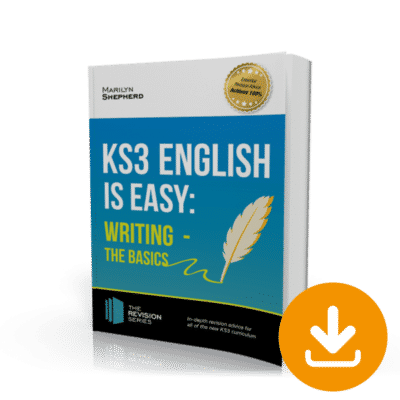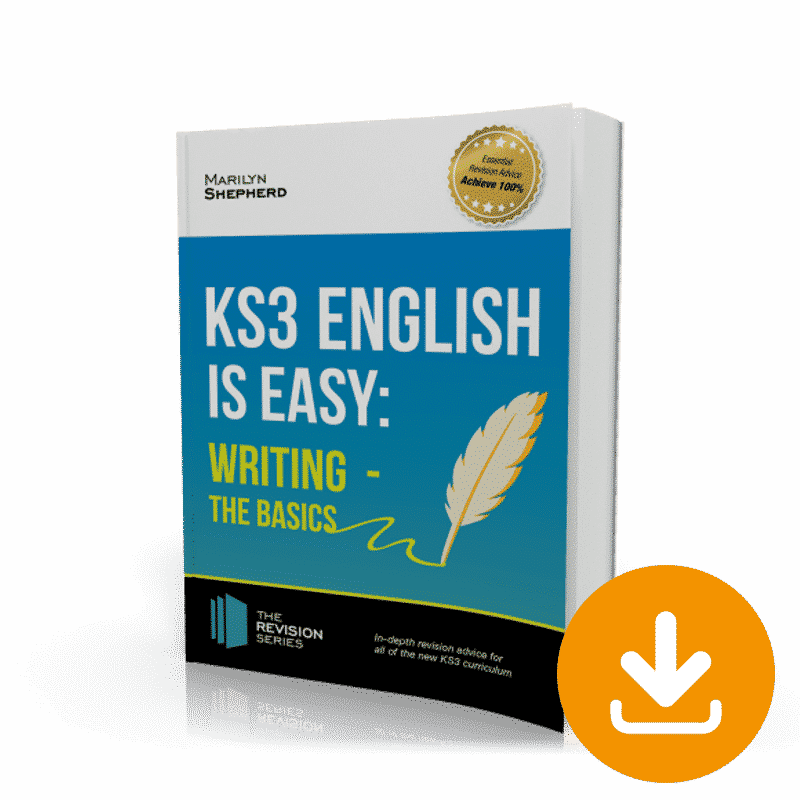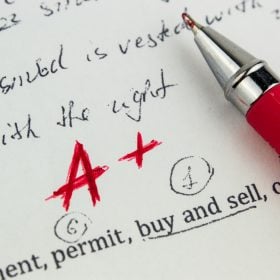KEY STAGE 3: WRITING (THE BASICS)
- 162-page interactive download guide for KS3 English;
- Advice for both your child and you;
- Up-to-date with the new national curriculum;
- English taught in a fun and engaging way from award-winning creators;
- An easy to follow breakdown of each topic;
- Questions, games and quizzes to track your progress;
- Achieve 100%!
KEY STAGE 3: WRITING (THE BASICS)
Writing forms an integral part of children’s learning. The ability to write effectively allows you to demonstrate a good understanding of the English language.
Writing is a great skill which can be altered to reflect different contexts, purposes and audiences. In Key Stage 3, students are required to write different literary texts, for different purposes. Thus, this requires a strong level of knowledge regarding vocabulary and grammar.
It is important that you understand how you will be assessed during your Key Stage 3 English exams. During the writing assessment, you will be assessed on the following.
Pupils will be taught how to:
- Write with fluency, ease and control.
- Writing a range of different literary texts including:
- Strong, persuasive, narrative essays.
- Short stories, plays and poetry.
- Imaginative writing.
- Formal letters.
- Scripts and presenations.
- Plan draft and prooread writing:
- Plan and draft your ideas. Think about:
- Characters, narrative, themes, motives, style. context, audience and purpose.
- Carefully choosing grammar and understanding the importance of vocabulary.
- Structuring your writing format in a clear and concise manner.
- Understanding the importance of audience and how your writing can infuential.
- Be original and creative.
- Use the English Language in a way that is expressive, creative , informative, Imaginative or personal.
The above should be used as a guideline to determine what areas your child should focus on when preparing for any written assessment.
STRUCTURING YOUR WRITING
What makes a good introduction? How can we as the writer ensure that our readers stick around to the very end? These questions are exactly the reason why an introduction to a text is so important.
An introduction needs to make your reader want to read on. Belo, we have outlined some of the key things you should consider when writing an introduction:
An introduction needs to make your reader want to read on. Belo, we have outlined some of the key things you should consider when writing an introduction:
1. Hook the reader!
- Introduce the text and set out what your text is going to be about.
- If it is a story, you will want to introduce the main character/s, the setting and tone of the narrative.
- If it’s a persuasive text, engage your reader by asking rhetorical questions.
- Understand the topic of the text, who your audience is, and what you want to achieve.
2. Keep the reader wanting more!
- Introduce the text and set out what your text is going to be about.
- If it is a story, you will want to introduce the main character/s, the setting and tone of the narrative.
- If it’s a persuasive text, engage your reader by asking rhetorical questions.
- Understand the topic of the text, who your audience is, and what you want to achieve.
The middle of your text is where ‘the bulk’ of your writing will take place.
This is where everything is going to happen, and will include all of the main points you wish to make.
3. Maintain reader’s interest!
- Your writing needs to use powerful literary techniques in order to engage the reader and make them want to read on.
- Consider all of the key points you wish to make and explore how they are relevant/important to the overall text.
- You need to include detailed descriptions.
- Think about TiPToP (time, place, topic, person)
4. Focus on your main points/topic!
- If you are writing a story, you need to include obstacles and complications.
- If you are writing a letter, you will need to include the main points you wish to cover. It is best to include a few main points and detail them, as opposed to including lots of points with little detail.
- Remember to use paragraphs for each new point
5. Make the reader think!
- A good middle will make the reader want to finish the text.
- If it is a story, you need to start resolving the complications in order to end the narrative.
- If it’s a letter, what do you want your reader to do/think after reading your text?
Every piece of writing needs a good ending. Of course, your ending will depend on what type of text you are writing. However, in generic sense, you need to sum up everything you have written.
6. Sum up your points/ideas!
- This is where the climax/main points of your text will be resolved.
- This is going to be the last thing your readers are going to remember. Therefore, you want to make a lasting impression on them.
7. Make a last impression!
- If you are writing a letter, this will use a very formal way of ending. If it’s a letter of complaint, your ending sentence should be along the lines of hoping to have an issue resolved. Generally, letters will also end as follows:

- If you are writing to persuade or argue, then you will want your readers to agree with everything you have said.
- If you are writing a story, your ending will need to sum up everything that has happened, and ties up the overall narrative.
- Your readers should be left feeling satisfied. They should have some idea of what you hoped to achieve, your reasons for it, any implications and a resolution.
BECOME THE BEST WRITER YOU CAN BE
Key Stage 3 Writing (The Basics) is the IDEAL guide for anyone who wishes to improve their writing skills.
Here at How2Become, we make sure that our education revision guides are clear, easy to use, and creative. We want to ensure that your child is fully prepared for their English assessment, and with the use of this guide, your child will definitely improve their writing!
All it takes is a little bit of time
and practice! Achieve 100%!
FREE BONUS
When you order you will receive the following free bonus;

Plus 30-days FREE ACCESS to the Educational online testing suite. Thereafter, just £5.95 per month. No minimum term. You may cancel anytime. Cancel before the 30-days are up and you will not be charged. Online suite access on PC, MAC and mobile devices.

✓ 30-Day Money-back Guarantee

✓ 30-Day Money-back Guarantee
Did you know? All orders with How2Become are protected by our 30-day money-back guarantee. What ever the reason…or no reason at all…you can have your money back if this resource isn’t right for you (see our terms for full details).













